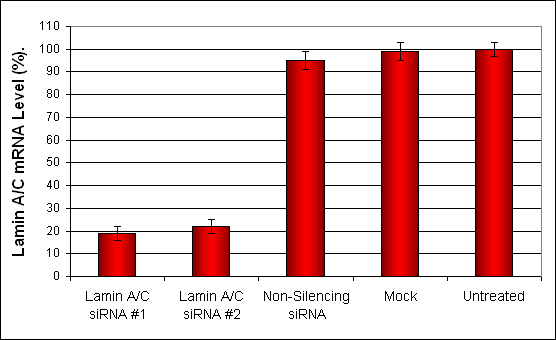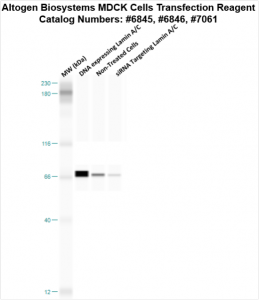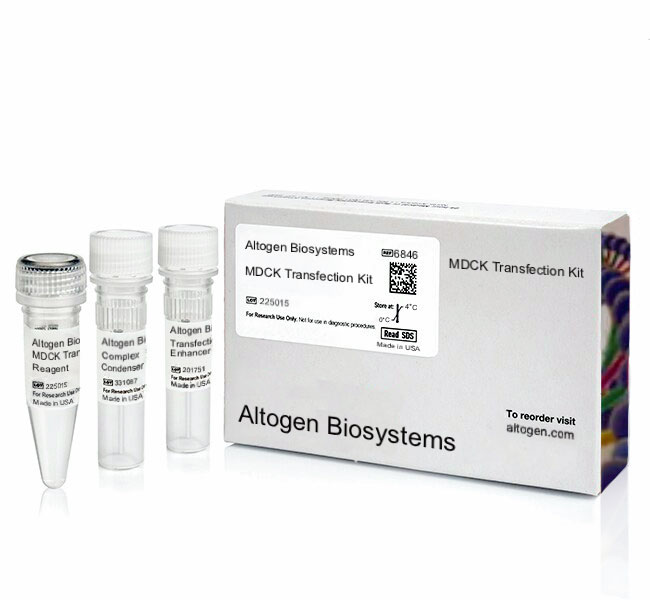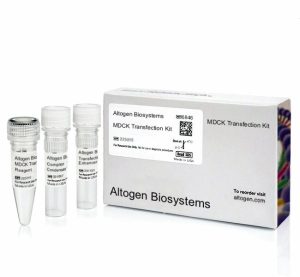Description
Purchase Orders: Click “Add to Cart” button to order, then email PO to orders@altogen.com.
Product Availability: In Stock.
Transfection Reagent for MDCK Cells (Kidney Cells, CCL-34)
- A biodegradable polymer based transfection reagent – once inside the cell, the polymer degrades into smaller less toxic components reducing cell toxicity, facilitating release of the transgene, and improving transfection efficiency
-
High transfection efficiency of both siRNA and plasmid DNA without compromising cell viability
-
Achieve robust siRNA uptake for dependable gene silencing
-
Effective transfection under conditions of up to 40% serum
-
Transfection kit includes Transfection Enhancer and Complex Condenser reagents
-
Download MDCK transfection protocol: [PDF]
- Download MDCK CRISPR/Cas9 transfection protocol: [PDF]
- Download PowerPoint presentation for MDCK cells transfection kit: [PPT]
- UPC/GTIN/EAN: 860002089783
-
Brand: ALTOGEN®, developed and manufactured by Altogen Biosystems
Transfection Efficiency:
Reagent exhibits at least 73% transfection efficiency of siRNA delivery. Transfection efficiency was determined by qRT-PCR.
Product Description:
This transfection kit is specially designed for the MDCK cell line, a canine kidney cancer cells. It ensures high efficiency in delivering both DNA and RNA into these cells.
Transfection Protocol and SDS:
Download Altogen Biosystems MDCK Transfection Protocol: [PDF]
Download SDS: [PDF]
MDCK Cell Line:
The epithelial cell line Madin-Darby Canine Kidney (MDCK) was derived from the kidney cells of an adult cocker spaniel (Canis familiaris) in 1958 and is positively tested for keratin by immunoperoxidase staining. This is a model mammalian cell line extensively employed in biomedical research. MDCK cells are useful for processing of beta-amyloid precursor protein and its products. MDCK cells are susceptible to viral infection but make good transfection host. These cells could be helpful in studying kidney cells function and gene expression for biomedical research purposes. Furthermore, the MDCK cell line is widely used in influenza studies. MDCK cells are hyperdiploid with a bi-modal chromosome number distribution. Most spreads comprise one normal X chromosome, but there are no consistent identifiable marker chromosomes. Altogen Biosystems produces polymer-based transfection reagent kits for the MDCK cell line.
MDCK cells are a type of epithelial cell that exhibit many of the characteristics of polarized epithelia found in vivo. They form monolayers with a distinct apical-basal polarity, and their apical surface is covered with microvilli. MDCK cells also form tight junctions, which are critical for maintaining the integrity of the epithelial barrier and regulating paracellular transport of ions and solutes. Due to their well-established polarity and tight junction formation, MDCK cells have been used to study the mechanisms underlying epithelial transport, including the absorption and secretion of various molecules, such as nutrients, electrolytes, and drugs. They have also been used to study the pathogenesis of several diseases that affect epithelial tissues, such as cystic fibrosis and influenza. MDCK cells have been used extensively in the production of viral vaccines, including influenza and measles, due to their ability to support the replication of many different types of viruses. In addition, they have been used in drug discovery and development, including in the screening of potential drug candidates for their ability to cross epithelial barriers.
Data:

Figure 1. siRNAs targeting Lamin A/C mRNA or non-silencing control siRNA were transfected into MDCK cells following the recommended protocol. At 48 hours post-transfection the cells were analyzed by RT-PCR for Lamin A/C gene expression levels. 18S rRNA levels were used to normalize the Lamin A/C data. Values are normalized to untreated sample. Data are means ± SD (n=4).

Figure 2. Protein expression of Lamin A/C in MDCK cells. DNA plasmid expressing Lamin A/C or siRNA targeting Lamin A/C were transfected into MDCK cells following Altogen Biosystems transfection protocol. At 72 hours post-transfection the cells were analyzed by Western Blot for protein expression levels (normalized by total protein, 10 µg of total protein loaded per each well). Untreated cells used as a negative control.
Altogen Biosystems provides pre-optimized transfection kits and electroporation products for life sciences and cancer research. Transfection protocols are optimized for individual cancer cell lines. Altogen Biosystems developed two types of in vivo delivery kits (animal transfection): 1) Tissue-targeted reagents (delivery of proteins, DNA, and RNA into liver, pancreas, or kidney tissues), and 2) Broad range in vivo biodistribution reagents (PEG-Liposome based reagent, Nanoparticle-based in vivo reagent, Lipid-based transfection kit, and Polymer-based kit). Read more about transfection technology at Altogen’s Transfection Resource. Altogen Labs provides GLP-compliant contract research studies for pre-clinical research. Biology CRO services includes: xenograft models, development of stable cell lines, ELISA assay development, cell-based and tissue targeted RNAi studies, safety pharm/tox assays, and more (visit AltogenLabs.com).
Volume Options:
- 0.5 ml (Catalog #6845)
- 1.5 ml (Catalog #6846)
- 1.5 ml CRISPR (Catalog #2171)
- 8.0 ml (Catalog #7061)
Purchase Orders: Click “Add to Cart” button to order, then email PO to orders@altogen.com.
Product Availability: In Stock.






